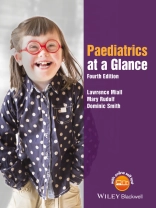Paediatrics at a Glance provides an introduction to paediatrics and the problems encountered in child health as they present in primary, community and secondary care, from birth through to adolescence.
Thoroughly updated to reflect changes in understanding of childhood illness over the last 5 years, the 4th edition of this best-selling textbook diagrammatically summarises the main differential diagnoses for each presenting symptom, while accompanying text covers important disorders and conditions as well as management information.
Paediatrics at a Glance:
* Is an accessible, user-friendly guide to the entire paediatric curriculum
* Features expanded coverage of psychological issues and ethics in child health
* Includes more on advances in genetics, screening and therapy of childhood illness
* Contains new videos of procedures and concepts on the companion website
* Includes a brand new chapter on Palliative Care – an emerging area in the specialty
* Features full colour artwork throughout
* Includes a companion website at www.ataglanceseries.com/paediatrics featuring interactive self-assessment case studies, MCQs, videos of the procedures and concepts covered in the book, and links to online resources
Paediatrics at a Glance is the ideal companion for anyone about to start a paediatric attachment or module and will appeal to medical students, junior doctors and GP trainees as well as nursing students and other health professionals.
Cuprins
Preface viii
Acknowledgements ix
Abbreviations x
How to use your textbook xii
About the companion website xiv
Part 1 Evaluation of the child 1
1 Paediatrics and child health 2
2 The paediatric consultation 4
3 Systems examination 6
4 Development and developmental assessment 12
5 Growth and puberty 16
6 Understanding investigations 20
Part 2 Moving through childhood 27
7 Screening 28
8 Genetics and inherited disorders 31
9 The newborn baby 34
10 Congenital abnormalities 36
11 Common neonatal problems 38
12 The premature baby 40
13 Nutrition in childhood 42
14 Common behaviour concerns 44
15 Child care and school 46
16 Child health promotion 48
17 The immunization schedule 50
Part 3 Growth, endocrine and metabolic 53
18 Weight faltering and failure to thrive 54
19 Short stature and poor growth 56
20 Obesity 58
21 Diabetes 60
Part 4 Cardiovascular disorders 63
22 Congenital heart disease 64
23 Heart problems in older children 66
Part 5 Fever 69
24 Acute fever 70
25 Persistent fever and serious recurrent infections 72
Part 6 Respiratory disorders 75
26 Cough and wheeze 76
27 Stridor 78
28 Swellings in the neck 79
29 Asthma 80
30 Cystic fibrosis 82
Part 7 Abdominal disorders 85
31 Acute abdominal pain 86
32 Vomiting 88
33 Acute diarrhoea and dehydration 90
34 Chronic diarrhoea 92
35 Recurrent abdominal pain 94
36 Constipation 96
Part 8 Urogenital disorders 99
37 Urinary tract infections 100
38 Haematuria and proteinuria 102
39 Bedwetting and daytime wetting 104
40 Swellings in the groin and scrotum 105
Part 9 Neurological disorders 107
41 Developmental delay 108
42 Headache 110
43 Fits, faints and funny turns 112
44 Epilepsy 114
45 Cerebral palsy 116
Part 10 Musculoskeletal disorders 119
46 Swollen joints 120
47 Juvenile idiopathic arthritis 121
48 Leg pain and limp 122
49 Common childhood skeletal problems 123
Part 11 Blood disorders 125
50 Anaemia and thrombocytopenia 126
51 Jaundice 128
52 Leukaemia and childhood cancer 130
Part 12 Skin disorders 133
53 Rashes–types of skin lesions 134
54 Rashes–infancy and congenital 136
55 Rashes–infections and infestations 138
56 Rashes–common inflammatory disorders 140
57 Allergy 142
Part 13 Emergency paediatrics 145
58 Assessing the acutely ill child 146
59 The collapsed child 150
60 The unconscious child 154
61 The fitting child 156
62 Injuries and burns 158
63 Poisoning 159
Part 14 Child health in the community 161
64 Living with a chronic illness 162
65 Living with a disability 164
66 Learning disability and autism 166
67 Visual and hearing impairment 168
68 Neglect and abuse 170
69 Adolescent issues 174
70 Sudden infant death 176
71 Ethics, research and consent 178
72 Palliative and end-of-life care 180
Index 182
Despre autor
Lawrence Miall is Consultant in Neonatal Medicine and Honorary Senior Lecturer, Leeds Teaching Hospitals NHS Trust and University of Leeds, Leeds, UK.
Mary Rudolf is Professor of Child Health and Consultant Paediatrician, University of Leeds and Leeds Community Health Care Trust, Leeds General Infirmary, Leeds, UK.
Dominic Smith is Consultant Paediatrician, Department of Child Health, York Teaching Hospital and Hull York Medical School, York, UK.












